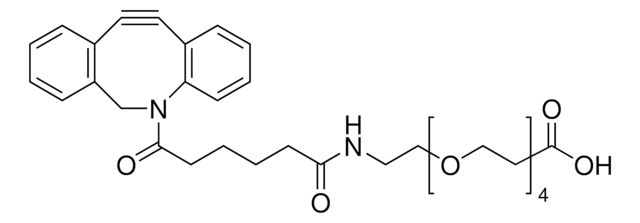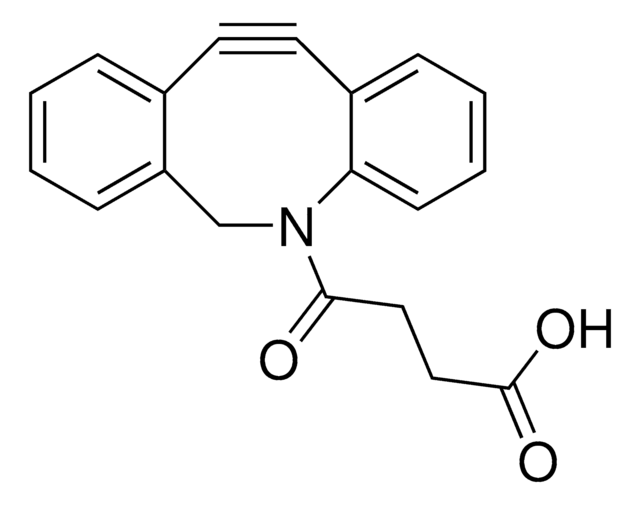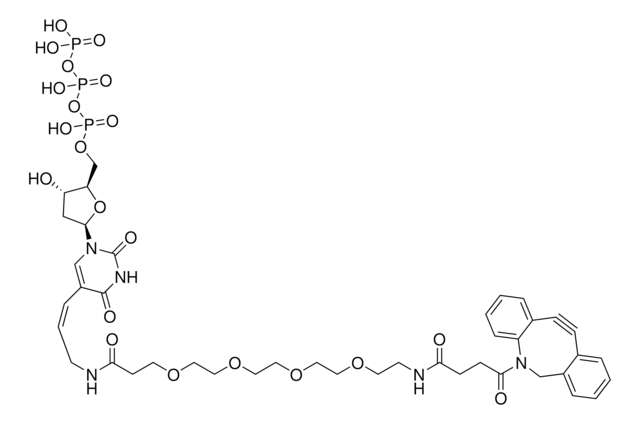761516
Dibenzocyclooctyne-acid
95%, storage temp.:-20°C
Sinónimos:
DBCO-Acid
Iniciar sesiónpara Ver la Fijación de precios por contrato y de la organización
About This Item
Fórmula empírica (notación de Hill):
C21H19NO3
Peso molecular:
333.38
MDL number:
UNSPSC Code:
12352106
PubChem Substance ID:
NACRES:
NA.22
Productos recomendados
Quality Level
assay
95%
form
solid
reaction suitability
reaction type: click chemistry
reagent type: linker
mp
118-125 °C
functional group
carboxylic acid
storage temp.
−20°C
SMILES string
O=C(CCCCC(O)=O)N1CC2=C(C=CC=C2)C#CC3=C1C=CC=C3
InChI
1S/C21H19NO3/c23-20(11-5-6-12-21(24)25)22-15-18-9-2-1-7-16(18)13-14-17-8-3-4-10-19(17)22/h1-4,7-10H,5-6,11-12,15H2,(H,24,25)
InChI key
NIRLBCOFKPVQLM-UHFFFAOYSA-N
General description
Acid functionalized cyclooctyne derivative. Cyclooctynes are useful in strain-promoted copper-free azide-alkyne click chemistry reactions. This azadibenzocyclooctyne will react with azide functionalized compounds or biomolecules without the need for a Cu(I) catalyst to result in a stable triazole linkage.
Application
Dibenzocyclooctyne-acid may be used for the surface modification of eight-arm poly(ethylene glycol), to make it susceptible to strain promoted alkyne-azide cycloaddition (SPAAC) with PEG-bis-azide leading to the formation of hydrogels. These hydrogels are useful for protein immobilization.
Storage Class
11 - Combustible Solids
wgk_germany
WGK 3
flash_point_f
Not applicable
flash_point_c
Not applicable
Elija entre una de las versiones más recientes:
¿Ya tiene este producto?
Encuentre la documentación para los productos que ha comprado recientemente en la Biblioteca de documentos.
Los clientes también vieron
Seyed Mohammad Mahdi Dadfar et al.
Small (Weinheim an der Bergstrasse, Germany), 14(21), e1800131-e1800131 (2018-04-24)
Different types of click chemistry reactions are proposed and used for the functionalization of surfaces and materials, and covalent attachment of organic molecules. In the present work, two different catalyst-free click approaches, namely azide-alkyne and thiol-alkyne click chemistry are studied
Chen Guo et al.
Acta biomaterialia, 56, 80-90 (2017-04-10)
Hydrogels are facile architectures for the controlled presentation of proteins with far-reaching applications, from fundamental biological studies in three-dimensional culture to new regenerative medicine and therapeutic delivery strategies. Here, we demonstrate a versatile approach for spatially-defined presentation of engineered proteins
Flexible synthesis of cationic peptide?porphyrin derivatives for light-triggered drug delivery and photodynamic therapy.
Dondi R, et al.
Organic & Biomolecular Chemistry, 14(48), 11488-11501 (2016)
Ratiometric Fluorescence Azide?Alkyne Cycloaddition for Live Mammalian Cell Imaging.
Fu H, et al.
Analytical Chemistry, 87(22), 11332-11336 (2015)
Neuroendocrine Tumor?Targeted Upconversion Nanoparticle?Based Micelles for Simultaneous NIR?Controlled Combination Chemotherapy and Photodynamic Therapy, and Fluorescence Imaging.
Chen G, et al.
Advances in Functional Materials, 27(8) (2017)
Nuestro equipo de científicos tiene experiencia en todas las áreas de investigación: Ciencias de la vida, Ciencia de los materiales, Síntesis química, Cromatografía, Analítica y muchas otras.
Póngase en contacto con el Servicio técnico











